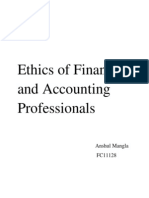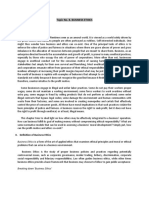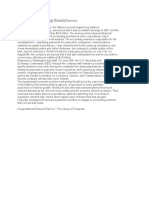Week12 AccountingEthics
Week12 AccountingEthics
Uploaded by
yow jing peiCopyright:
Available Formats
Week12 AccountingEthics
Week12 AccountingEthics
Uploaded by
yow jing peiOriginal Description:
Original Title
Copyright
Available Formats
Share this document
Did you find this document useful?
Is this content inappropriate?
Copyright:
Available Formats
Week12 AccountingEthics
Week12 AccountingEthics
Uploaded by
yow jing peiCopyright:
Available Formats
Week 12:
Accounting Ethics
LO 1
The Importance of Ethics
The nature of the work carried out by
accountants and auditors requires a
high level of ethics.
Shareholders, potential
shareholders, and other users of the
financial statements rely heavily on
the yearly financial statements of a
company as they can use this
information to make an informed
decision about investment.
LO 1
The Importance of Ethics
They rely on the opinion of the:
accountants who prepared the statements
auditors that verified them, to present a true
and fair view of the company.
Knowledge of ethics can help accountants
and auditors to overcome ethical
dilemmas
the right choice
although may not benefit the company,
will benefit the public.
Ethical Obligations of Accountants
Aristotles Virtues
Trustworthiness,
benevolence, altruism
Honesty, integrity
Impartiality, openmindedness
Reliability,
dependability,
faithfulness
Trustworthiness
Ethical Standards for CPAs
Integrity
Truthfulness, non-deception
Objectivity, independence
Loyalty (confidentiality)
Due care (competence and
prudence)
Accounting Community Citizenship
Honoring public trust
Acting with integrity in
performance of professional
services
Being independent of clients
Making decisions objectively
Exercising due care in the
performance of services
LO 1
Ethical Standards
Are issued by many accounting bodies
Contain clear specific guidelines as to
what accountants/auditors can or
cannot do.
E.g. Auditors cannot receive gifts from
clients (may be bribes)
E.g. Accountants have a duty to
ensure that the work is done carefully
LO 1
Accounting scandals
From the 1980s to the present there
have been multiple accounting
scandals that were widely reported
on by the media and resulted in
fraud charges, bankruptcy protection
requests, and the closure of
companies and accounting firms.
LO 1
Causes of accounting scandals
Creative accounting
A primary benefit of public accounting
statements is that they allow investors to
compare the financial health of competing
companies.
However, when firms indulge in creative
accounting they often distort the value of
the information that their financials provide.
Can be used to manage earnings and to
keep debt off the balance sheet.
LO 1
Causes of accounting scandals
Fraud
deceptive accounting practices, manipulation
to maintain the appearance of sustainability
E.g. recording future expected sales
E.g. understating expenses through such means
as capitalizing operating expenses
E.g. inflating assets' net worth by knowingly
failing to apply an appropriate depreciation
schedule
E.g. hiding liabilities off of the company's balance
sheet
LO 1
Causes of accounting scandals
The motivations of creative accounting &
fraud
Personal incentives
Bonus-related pay
Benefits from shares and share options
Job security
Personal satisfaction
Tax management
LO 1
Enron
Fraudulent accounting practices - Nugan
Hand Bank, Phar-Mor, WorldCom & AIG.
Enron, a multinational company
For several years had not shown a true or
fair view of their financial statements.
Auditor Arthur Andersen signed off on the
validity of the accounts despite the
inaccuracies in the financial statements.
LO 1
Enron
Enron, a multinational company
When the unethical activities were
reported, not only did Enron dissolve but
Arthur Andersen also went out of business.
Enron's shareholders lost $25billion as a
result of the company's bankruptcy.
Although only a fraction of Arthur
Anderson's employees were involved with
the scandal, the closure of the firm resulted
in the loss of 85,000 jobs.
LO 1
Responses to scandals
New reforms, new regulations, ethical education to improve the credibility of the accounting
profession.
New regulations include the Sarbanes-Oxley Act
of 2002 (US).
limits the level of work which can be carried out by accounting
firms.
puts a limit on the fee which a firm can receive from one client
as a % of their total fees.
This ensures that companies are not wholly reliant on one firm
for its income, in the hope that they do not need to act
unethically to keep a steady income.
LO 1
Responses to scandals
Sarbanes-Oxley Act of 2002 (US)
protects whistleblowers
requires senior management in public
companies to sign off on the accuracy of
its company's accounting records.
LO 1
Responses to scandals
In 2003, the International Federation of
Accountants (IFAC)
determined areas for improvement within
organizations
Developed recommendations for companies
to develop more effective ethics codes.
recommended that companies improve
training and support so accountants could
better handle ethical dilemmas.
You might also like
- Case 1.1 Enron CorporationDocument6 pagesCase 1.1 Enron CorporationZizhang Huang88% (8)
- Week6 AComprehensiveIllustrationDocument86 pagesWeek6 AComprehensiveIllustrationyow jing pei89% (28)
- Financial Statement Analysis: Submitted By: Saket Jhanwar 09BS0002013Document5 pagesFinancial Statement Analysis: Submitted By: Saket Jhanwar 09BS0002013saketjhanwarNo ratings yet
- Tyco Scandal (2002) : (Acc C607-302A Auditing and Good Governance)Document20 pagesTyco Scandal (2002) : (Acc C607-302A Auditing and Good Governance)Jericho Dupaya100% (2)
- Part 3, 4Document7 pagesPart 3, 4Rashid Mahmood ArqamNo ratings yet
- Red Flags of Enron's of Revenue and Key Financial MeasuresDocument24 pagesRed Flags of Enron's of Revenue and Key Financial MeasuresJoshua BailonNo ratings yet
- Case Study 1Document5 pagesCase Study 1May-AnnJoyRedoñaNo ratings yet
- ACCG315Document4 pagesACCG315Joannah Blue0% (1)
- Creative AccountingDocument5 pagesCreative Accountingvikas_nair_2No ratings yet
- Case 4.1: Enron Coporation and Andersen, LLPDocument6 pagesCase 4.1: Enron Coporation and Andersen, LLPthppNo ratings yet
- Unit 8 FinanceDocument4 pagesUnit 8 FinanceNgọc Nguyễn NhưNo ratings yet
- The Accounting Fraud in WorldComDocument12 pagesThe Accounting Fraud in WorldComsyahirah77100% (1)
- Auditing Is A Systematic Process of Obtaining and Examining The Transparency and Truth of Financial Records of A Business Entity or The GovernmentDocument3 pagesAuditing Is A Systematic Process of Obtaining and Examining The Transparency and Truth of Financial Records of A Business Entity or The GovernmentAsif RahmanNo ratings yet
- Assignment 1 Final Paper (Edited)Document8 pagesAssignment 1 Final Paper (Edited)paterneNo ratings yet
- Enron Case StudyDocument9 pagesEnron Case StudyMojiNo ratings yet
- Case Study Session 1 Group 7Document4 pagesCase Study Session 1 Group 7rifqi salmanNo ratings yet
- What Is Accounting EthicsDocument3 pagesWhat Is Accounting EthicsNawshad HasanNo ratings yet
- Enron Scandal Enron Scandal Is A Series of Events That Resulted in The Bankruptcy of The U.S. EnergyDocument3 pagesEnron Scandal Enron Scandal Is A Series of Events That Resulted in The Bankruptcy of The U.S. EnergyLeanne Quinto100% (1)
- Acct 201 - Chapter 4Document24 pagesAcct 201 - Chapter 4Huy TranNo ratings yet
- Ethics in Accounting & FinanceDocument10 pagesEthics in Accounting & FinancesaniNo ratings yet
- BeDocument4 pagesBeSagar SalimNo ratings yet
- PP07 Chapter7Document27 pagesPP07 Chapter7Husna ManzoorNo ratings yet
- Group 18 - Enron Corp and Andersen, LLP PDFDocument7 pagesGroup 18 - Enron Corp and Andersen, LLP PDFMAMBA, MIERMAY JEAN P.No ratings yet
- Discussion Unit 2 (Enron and Anderson)Document2 pagesDiscussion Unit 2 (Enron and Anderson)mooon RNo ratings yet
- Lin Problem Solution FinalDocument9 pagesLin Problem Solution Finalapi-396000769No ratings yet
- Introduction To Accounting Concepts and PracticeDocument122 pagesIntroduction To Accounting Concepts and Practicedonutchuu100% (1)
- PP01 Chapter1Document40 pagesPP01 Chapter1Husna ManzoorNo ratings yet
- What Were The Business Risks Enron Faced, and How Did Those Risks Increase The Likelihood of Material Misstatements in Enron's Financial Statements?Document11 pagesWhat Were The Business Risks Enron Faced, and How Did Those Risks Increase The Likelihood of Material Misstatements in Enron's Financial Statements?CrystalNo ratings yet
- Enron Case StudyDocument9 pagesEnron Case StudyDr CommissionerNo ratings yet
- BlogDocument2 pagesBlogKhánh LinhNo ratings yet
- Arthur Andersen-Worldcom ScandalDocument4 pagesArthur Andersen-Worldcom Scandalmy1bima100% (7)
- Case 4.1 EnronDocument11 pagesCase 4.1 EnronCrystalNo ratings yet
- Bindiya Final AssignmentDocument2 pagesBindiya Final AssignmentBindiya GandhiNo ratings yet
- Tóm tắtDocument28 pagesTóm tắtchinh phạmNo ratings yet
- Ethics of Finance and Accounting ProfessionalsDocument14 pagesEthics of Finance and Accounting ProfessionalsKhushboo GuptaNo ratings yet
- Chapter 1 PAIDocument18 pagesChapter 1 PAIabdihalimNo ratings yet
- Window Dressing in Corporate Financial ReportingDocument38 pagesWindow Dressing in Corporate Financial Reportingaaquib1110No ratings yet
- Why Is Forensic Accounting Required?Document6 pagesWhy Is Forensic Accounting Required?Neha Singh0% (1)
- Corporate Malpractices - Some Recent Cases of Corporate Malfunctioning in Foreign CountriesDocument3 pagesCorporate Malpractices - Some Recent Cases of Corporate Malfunctioning in Foreign CountriesSALONI KUMARINo ratings yet
- Accounting 107: Auditing and Assurance Audit QualityDocument4 pagesAccounting 107: Auditing and Assurance Audit QualityJanelleNo ratings yet
- Worldcom Accounting Scandal: SynopsisDocument16 pagesWorldcom Accounting Scandal: SynopsisJulrick Cubio EgbusNo ratings yet
- Larsen10 ch01Document31 pagesLarsen10 ch01Ibrahim HafezNo ratings yet
- Capitalism in A Post Enron WorldDocument10 pagesCapitalism in A Post Enron WorldSony Soha100% (1)
- Pribanic WhitepaperDocument9 pagesPribanic WhitepaperCaleb PribanicNo ratings yet
- ENRON CASE ANALYSIS.v1Document17 pagesENRON CASE ANALYSIS.v1Edward MachariaNo ratings yet
- Unit 8Document4 pagesUnit 8Nguyễn Anh MinhNo ratings yet
- Case Study On Window Dressing of Any Company or Brand in AccountancyDocument12 pagesCase Study On Window Dressing of Any Company or Brand in AccountancyKunal SinghNo ratings yet
- Accountants Are Viewed As VilliansDocument1 pageAccountants Are Viewed As VilliansEkta KushwahaNo ratings yet
- Enron Final Case StudyDocument4 pagesEnron Final Case StudyElvie Abulencia-BagsicNo ratings yet
- Enron Case StudyDocument3 pagesEnron Case StudyDavid Wijaya100% (1)
- Case Study (Enron Company)Document11 pagesCase Study (Enron Company)AngelgraceregaladoNo ratings yet
- The Enron Corporation Story Depicts A Company That Reached Dizzying Heights Only To Plummet DramaticallyDocument3 pagesThe Enron Corporation Story Depicts A Company That Reached Dizzying Heights Only To Plummet DramaticallySi Reygie Rojas KoNo ratings yet
- Order 130889 341420Document11 pagesOrder 130889 341420Moffat HarounNo ratings yet
- Enron and AndersonDocument30 pagesEnron and AndersonAzizki Wanie100% (2)
- Chapter 9 Ethical Business ... SustainabilityDocument21 pagesChapter 9 Ethical Business ... Sustainabilitychelinti33% (3)
- Auditing: Encyclopædia Britannica ArticleDocument4 pagesAuditing: Encyclopædia Britannica ArticleMukeshChhawariNo ratings yet
- Case Study EnronDocument5 pagesCase Study EnronFerl Diane SiñoNo ratings yet
- Summary of Howard M. Schilit, Jeremy Perler & Yoni Engelhart's Financial Shenanigans, Fourth EditionFrom EverandSummary of Howard M. Schilit, Jeremy Perler & Yoni Engelhart's Financial Shenanigans, Fourth EditionNo ratings yet
- Ebf1013 Assignment 1 RatiosDocument2 pagesEbf1013 Assignment 1 Ratiosyow jing peiNo ratings yet
- Mid SemesterExam.Q ADocument4 pagesMid SemesterExam.Q Ayow jing pei100% (4)
- Week3a.journals LedgersDocument10 pagesWeek3a.journals Ledgersyow jing peiNo ratings yet
- LedgerDocument4 pagesLedgeryow jing peiNo ratings yet
- Ebf1013 Assignment 1 RatiosDocument3 pagesEbf1013 Assignment 1 Ratiosyow jing peiNo ratings yet
- CHAPTER 3 - Accounting EquationDocument16 pagesCHAPTER 3 - Accounting Equationyow jing pei100% (2)
- Week2b.manualDoubleEntrySystem - Exercises WithoutAnswersDocument4 pagesWeek2b.manualDoubleEntrySystem - Exercises WithoutAnswersyow jing peiNo ratings yet
- Week7.Partnerships Corporations OtherOrganisationsDocument40 pagesWeek7.Partnerships Corporations OtherOrganisationsyow jing peiNo ratings yet
- Pleting The Accounting CycleDocument65 pagesPleting The Accounting Cycleyow jing peiNo ratings yet
- Week 8: Financial Statement Analysis & PerformanceDocument41 pagesWeek 8: Financial Statement Analysis & Performanceyow jing peiNo ratings yet
- Week4 ClosingTheAccounts TheAdjustingProcessDocument49 pagesWeek4 ClosingTheAccounts TheAdjustingProcessyow jing peiNo ratings yet
- Accounting Framework and ConceptsDocument30 pagesAccounting Framework and Conceptsyow jing peiNo ratings yet
- Week1c.introduction - Exercises WithoutAnswersDocument8 pagesWeek1c.introduction - Exercises WithoutAnswersyow jing peiNo ratings yet
- Cash Flow StatementsDocument19 pagesCash Flow Statementsyow jing peiNo ratings yet
- Week6 SampleExamQuestionDocument16 pagesWeek6 SampleExamQuestionyow jing pei67% (3)
- Property, Plant & Equipment (Fixed Assets) : Reeve Warren DuchacDocument33 pagesProperty, Plant & Equipment (Fixed Assets) : Reeve Warren Duchacyow jing peiNo ratings yet
- Week3c ReceivablesDocument14 pagesWeek3c Receivablesyow jing peiNo ratings yet
- Bank Reconciliation StatementDocument17 pagesBank Reconciliation Statementyow jing pei100% (1)
- Warehouse Study Management ProjectDocument46 pagesWarehouse Study Management Projectyow jing peiNo ratings yet
- Weekly ScheduleDocument1 pageWeekly Scheduleyow jing peiNo ratings yet
- Supplier Relationship Management in The Context of Supply Chain ManagementDocument12 pagesSupplier Relationship Management in The Context of Supply Chain Managementyow jing pei100% (1)
- PrepositionDocument22 pagesPrepositionyow jing pei100% (1)
- Preposition Teaching PresentationDocument20 pagesPreposition Teaching Presentationyow jing pei100% (1)
- Prepositions: 6.1 What Is A Preposition?Document6 pagesPrepositions: 6.1 What Is A Preposition?yow jing peiNo ratings yet
- Question 3 & 5Document4 pagesQuestion 3 & 5hannaniNo ratings yet
- Materi 6 - ToshibaDocument46 pagesMateri 6 - ToshibaNur AzizahNo ratings yet
- Kasus Evaluating - Financial - Evidences - and - Early - Detection PDFDocument10 pagesKasus Evaluating - Financial - Evidences - and - Early - Detection PDFfransNo ratings yet
- CGE Assignment I Enron Scam Group3Document32 pagesCGE Assignment I Enron Scam Group3Nishant Shrivastava2020100% (1)
- Àmjj JJMJJ JJMJJJJJJJ JJJJJJJ JJ: JJJ JJJ JJJDocument7 pagesÀmjj JJMJJ JJMJJJJJJJ JJJJJJJ JJ: JJJ JJJ JJJDezekiel DriapNo ratings yet
- Debacle of Satyam Computers Limited: A Case Study of India's EnronDocument40 pagesDebacle of Satyam Computers Limited: A Case Study of India's EnronSultana ChowdhuryNo ratings yet
- PTCL's Privatization: The Biggest Financial Scam in Pakistan's History?Document4 pagesPTCL's Privatization: The Biggest Financial Scam in Pakistan's History?ash haq100% (1)
- Final Paper AuditingDocument23 pagesFinal Paper Auditingchadvincent.bollosaNo ratings yet
- Engl145 Assignment 1: Business' Coursebook and State How Do These Developments/ Changes Affect A TraditionalDocument2 pagesEngl145 Assignment 1: Business' Coursebook and State How Do These Developments/ Changes Affect A TraditionalMaryam AhmedNo ratings yet
- Lecture 3-Risk Materiality-JUNE 2023 Revised 1Document103 pagesLecture 3-Risk Materiality-JUNE 2023 Revised 1Sheany LinNo ratings yet
- Assignment 2Document15 pagesAssignment 2Brian Tan Wai Ken100% (1)
- Topic No. 8. Business EthicsDocument13 pagesTopic No. 8. Business EthicsElaine Joyce GarciaNo ratings yet
- Motives and Consequences of Fraudulent Financial ReportingDocument8 pagesMotives and Consequences of Fraudulent Financial ReportingAndreea VioletaNo ratings yet
- Final Exam Management Control SystemDocument8 pagesFinal Exam Management Control SystemJonghoneydew ChoiNo ratings yet
- Detecting Accounting Fraud - The Case of Let's Gowex SA: Document de RecercaDocument47 pagesDetecting Accounting Fraud - The Case of Let's Gowex SA: Document de RecercaAshraf Uz ZamanNo ratings yet
- Ethics in AccountsDocument7 pagesEthics in AccountsArun Kumar NairNo ratings yet
- Ricoh India Accounting Fraud 2016: ConclusionDocument4 pagesRicoh India Accounting Fraud 2016: ConclusionRidhima KalraNo ratings yet
- CA Final Audit Conceptual NotesDocument227 pagesCA Final Audit Conceptual Notesfaheh37570No ratings yet
- Fraudulent Financial Reporting With Fraud Pentagon Perspective: The Role of Corporate Governance As ModeratorDocument21 pagesFraudulent Financial Reporting With Fraud Pentagon Perspective: The Role of Corporate Governance As ModeratorAJHSSR Journal100% (1)
- Forensic Accounting As A Tool For Fraud Prevention and Detection in Deposit Money Banks in NigeriaDocument11 pagesForensic Accounting As A Tool For Fraud Prevention and Detection in Deposit Money Banks in NigeriaGeorge Valentine Nelson D RozarioNo ratings yet
- WorldCom Accounting ScandalSummaryDocument6 pagesWorldCom Accounting ScandalSummarysamuel debebeNo ratings yet
- CEOs CFOs and Accounting Fraud PDFDocument5 pagesCEOs CFOs and Accounting Fraud PDFClaire Joy CadornaNo ratings yet
- Waste Management Scandel (1998)Document9 pagesWaste Management Scandel (1998)Daniyal BilalNo ratings yet
- Fraud and ErrorDocument6 pagesFraud and ErrorJACQUELYN PABLITONo ratings yet
- Europe's Enron - The EconomistDocument3 pagesEurope's Enron - The Economistইরফানুল আলম সিদ্দীকি100% (1)
- Group 05 Slide - The Lesley Fay CompanyDocument33 pagesGroup 05 Slide - The Lesley Fay CompanyNazmulNo ratings yet
- Ais Rivera PDFDocument12 pagesAis Rivera PDFHannah LegaspiNo ratings yet
- The Case:-: Toshiba's Take On The IssueDocument1 pageThe Case:-: Toshiba's Take On The IssueAman100% (1)
- The Waste Management Scandal of 1998 FDocument19 pagesThe Waste Management Scandal of 1998 FDaniyal BilalNo ratings yet


















































































































